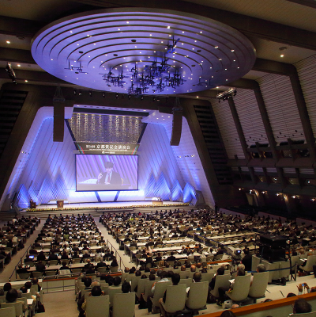The 2022 Kyoto Prize

Open to the public, the Kyoto Prize Commemorative Lectures are great opportunities to hear up-close what laureates have to say about their exceptional contributions to the progress of science and spiritual betterment of humankind. Expect to be graced with not just what they have studied and achieved, but also their outlook on life, their values, their way of thinking, and other aspects of their individual perspectives. In order to prevent the spread of COVID-19, Commemorative Lectures for the 2022 Kyoto Prize will be pre-recorded and published online. Please enjoy the lectures and their introduction videos on the 2022 Kyoto Prize Special Website!
2022
11 /10 Thu
Distribution starts at 10:00 a.m. JST
Place:You can enjoy this year’s lectures on the 2022 Kyoto Prize Special Website.
The 2022 Kyoto Prize Kyoto Prize Laureates
Lecture topics
A Personal Journey Through the Information Revolution
Abstract of the lecture
A number of innovations were required before it was practical to design complex integrated circuits, containing millions of transistors, and create the mask patterns for their production. First, the semiconductor community needed to be convinced that ultra-small transistors would function properly. Then a design paradigm was needed wherein all stages of the design—Function, Architecture, Logic, Circuit, and Mask Geometry—were specified by computer programs rather than by hand drawings, and that an overall interconnection strategy guided all steps of the design. Then computer tools were needed that would generate pattern-generation code for a computer-driven precision pattern generator. Once such a design paradigm was shown to generate working VLSI chips, it was necessary to create a unified view of the physical integrated circuit that could be understood by non-specialists, and incorporate the entire corpus of material into an academic course. The result has changed the world.
Lecture topics
Epidemiological and Evolutionary Dynamics of Pathogens in Time and Space
Abstract of the lecture
I have spent my career exploring the population dynamics and evolution of infectious diseases. I begin this lecture by introducing epidemics and the rich historical data sets which illuminate their dynamics. I focus on measles as a clear exemplar of the epidemic dynamics of acute immunizing infections. I then describe my research, under three main themes. First, I and collaborators explored the non-linear temporal dynamics of childhood infections, notably measles. We used simple mathematical models and time series analysis of epidemic data to explain oscillatory, sometimes chaotic epidemic sequences and the impact of seasonal and demographic drivers and vaccination on these patterns. Second, we analyzed the spatio-temporal dynamics of regional epidemics and the determinants of local epidemic persistence. Third, we explored the evolutionary dynamics of partly-immunizing pathogens such as influenza and SARS-CoV-2. I coined the term “phylodynamics” for the interactions between viral evolution and epidemiology that drives the “escape” of viral variants from prevailing immunity; phylodynamic ideas have since been applied to a wide variety of problems in pathogen evolution. I conclude by drawing broader lessons from my career, notably the power and pleasure of interdisciplinary collaboration.
Lecture topics
Commemorative Lecture and Performance
Abstract of the lecture
The commemorative lecture and performance is of Zakir Hussain's lecture on tabla and the north Indian classical music and his performance with two other musicians, Abbos Kosimov and Pezhham Akhavass. Lecture Zakir Hussain Performance Zakir Hussain, Tabla Abbos Kosimov, Doyra Pezhham Akhavass, Tombak
Contact
If you have any question or comment, please feel free to contact us.
Phone: +81-75-746-2523 [Available: Weekday (Mon.-Fri.) 10:00-16:00]